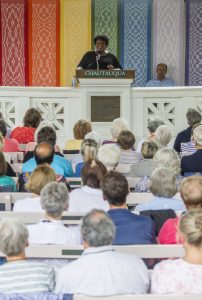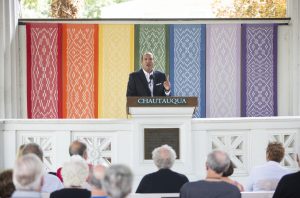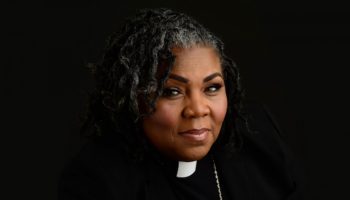
At 38 Clark, the African American Heritage House stands tall, overflowing with new programming in an effort to increase diversity.
The house itself, which is temporary for the organization, has been home to five musicians who are part of the Chautauqua Symphony Orchestra Diversity Fellowship Program, which aligns with the house’s mission to make Chautauqua “a more vibrant community.”
Erroll Davis, AAHH board chair, said in addition to establishing a permanent physical house, their goal is to bring all types of new people to Chautauqua through the new AAHH Speaker Series and other types of programs.
“We believe Chautauqua should be a more welcoming place for all,” Davis said. “The Institution, … as we are, (is) focused on increasing diversity.”
The AAHH began 10 years ago as the African American Denominational House. Last year, as a denominational house, members hosted porch chats and other dialogues with the community.
This is the first year that the organization moved away from the denominational house status; the move allowed the organization to invest more in their season’s programming, Davis said.
“We wanted to have a speaker series,” Davis said. “We could not have one as a denominational house, so we resigned our denominational status earlier this year.”
The AAHH’s goal is to create a welcoming environment within the Institution through the showcase of African American culture and history. Every Wednesday in the Hall of Philosophy this season, the programming has ranged from prominent African American political figures, like Stacey Abrams, and preachers to musicians and historians.
Geof Follansbee, the AAHH treasurer, has been on the organization’s board since its founding. He said this year, particularly with the speaker series, it’s been important to bring up and “heal the tensions that exist surrounding race.”
“The Wednesday afternoon programs have enlivened the conversations within the community,” Follansbee said. “But it’s begun conversations that otherwise wouldn’t have happened without this programming.”
Davis said in the long term, he hopes the Institution is a home to many different cultures and backgrounds that truly reflect the composition of America. He said he and the board discussed that African Americans in particular weren’t coming to the Institution, though “this certainly isn’t an unwelcoming place,” and not because of a cost issue, but because nothing was attracting them to come.
Inclusion, diversity, equity and accessibility — IDEA — is a key component of the Institution’s new strategic plan, 150 Forward. Shannon Rozner, the Institution’s chief of staff and vice president of strategic initiatives, said AAHH’s work plays a key role in the Institution’s future.
“We’re grateful to African American Heritage House leadership for their considerable efforts in programming and community-building,” Rozner said, “all of which serves a critical role inside our overall efforts at Chautauqua to instill the values of inclusion, diversity, equity and accessibility in pursuit of our mission, and to fulfill a strategic plan that guides our future.”

MHARI SHAW/STAFF PHOTOGRAPHER
In addition to some of the new changes in the AAHH, the board appointed Davis as its chair this year. The board is a group of individuals dedicated to the AAHH and its growth. He said the team is small, but he hopes that as they head into a new season, their community will grow.
“We have identified some people who have any interest in working with us,” Davis said. “I don’t have hundreds of people volunteering right at the moment. … I think it’s in our interest to have people with shared experiences helping in the effort.”
Follansbee said a strategy to help bring awareness to the AAHH is to build on the connections they’ve created over the years.
“What we need to do is build on the connections that members of the board have,” Follansbee said, “and with the people who care to build a volunteer network of advocates who are willing to give testimony as to Chautauqua’s education and artistic experience to others.”




